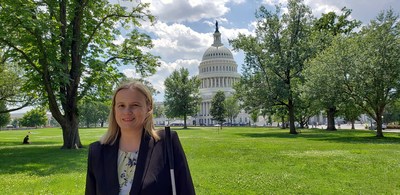|
19.02.2020 19:57:00
|
The American Foundation for the Blind's Questions for Presidential Candidates
WASHINGTON, Feb. 19, 2020 /PRNewswire/ -- As the race for the 2020 Presidential election heats up and the field of candidates narrows, the 26.9 million Americans who are blind and low vision are paying close attention to what the candidates of all political parties plan to do to improve education, employment, and community participation for people with vision loss.

Blind and low vision people represent a broad cross-section of American society and represent all races, religions, genders, sexual orientations, ages, immigration statuses, and political persuasions. Therefore, people with vision loss care about the same issues as other voters, such as healthcare, education, and foreign policy. However, the blind community is also impacted by many issues and public policies that are unique to people with disabilities and people with vision loss.
As Baby Boomers age, more Americans are living longer, and medical advances save the lives of premature babies and people with serious injuries, vision loss will affect an increasingly larger segment of the population in the United States. However, the presidential debates rarely feature questions that allow people with vision loss to gauge where the candidates stand on issues that impact their daily lives.
The American Foundation for the Blind encourages debate moderators and journalists to ask the following questions:
"What would you do to improve and modernize our country's paratransit system?"
"What would you do to ensure that autonomous vehicles are fully accessible to people with disabilities?"
"Would you leverage ride-sharing services, autonomous vehicles, and other innovative technology to improve public transportation? How will you ensure these options are inclusive of people with disabilities?"
"The Americans with Disabilities Act has been the law of the land since 1990, and the Department of Justice made it clear over 20 years ago that the ADA applies to public accommodations' websites. Do you believe it is a priority for the Department of Justice to issue website and app accessibility regulations in your presidency? If so, how do you characterize the issues at stake with these regulations?"
"As technology advances, what will you do to encourage technology companies to build in accessibility from the beginning of product development? Do you foresee the eventual need for new accessible technology legislation?"
"What will you do to ensure that K-12 schools, colleges, and universities use educational technology and learning materials that are accessible to all students?"
"There is a national shortage of special educators and related service providers to work with children birth to 21 years of age, including those who are blind and low vision. What will your administration do to ensure all children have high-quality teachers, especially children with disabilities?"
"There are several grants and programs aimed at demonstrating and educating people with disabilities on assistive technology, but few programs that actually get assistive technology into the hands of blind job-seekers, blind professionals, and older adults with vision loss. How will your administration increase the actual provision of assistive technology devices to the people who need them?"
"What will you do to improve vocational rehabilitation services for transition-aged youth; adult job seekers; employees who acquire disabilities during their career and want to remain employed; and older Americans with vision loss who want to remain in the workforce?"
"What will you do to improve the availability of blindness and low vision rehabilitation services to older adults with vision loss?"
"In addition to insufficient availability of services, people with age-related vision loss often do not receive the specialized services they need because of a lack of coordination between medical providers, government-funded rehabilitation programs, and other private service providers. How would your administration improve coordination of services and resources for older people with vision loss across federal agencies and federally-funded programs?"
"Will your administration explore Medicare coverage for low vision evaluations, low vision devices, orientation and mobility services, assistive technology devices and instruction, and independent living skills training?"
To learn more about the policy concerns of the blind and low vision community, please contact communications@afb.org.
About the American Foundation for the Blind
Founded in 1921, the American Foundation for the Blind (AFB) is a national nonprofit that creates a world of no limits for people who are blind or visually impaired. AFB mobilizes leaders, advances understanding, and champions impactful policies and practices using research and data. AFB is proud to steward the Helen Keller Archive, maintain and expand the digital collection, and honor the more than 40 years that Helen Keller worked tirelessly with AFB. Visit: www.afb.org
![]() View original content to download multimedia:http://www.prnewswire.com/news-releases/the-american-foundation-for-the-blinds-questions-for-presidential-candidates-301007702.html
View original content to download multimedia:http://www.prnewswire.com/news-releases/the-american-foundation-for-the-blinds-questions-for-presidential-candidates-301007702.html
SOURCE American Foundation for the Blind
 Der finanzen.at Ratgeber für Aktien!
Der finanzen.at Ratgeber für Aktien!
Wenn Sie mehr über das Thema Aktien erfahren wollen, finden Sie in unserem Ratgeber viele interessante Artikel dazu!
Jetzt informieren!